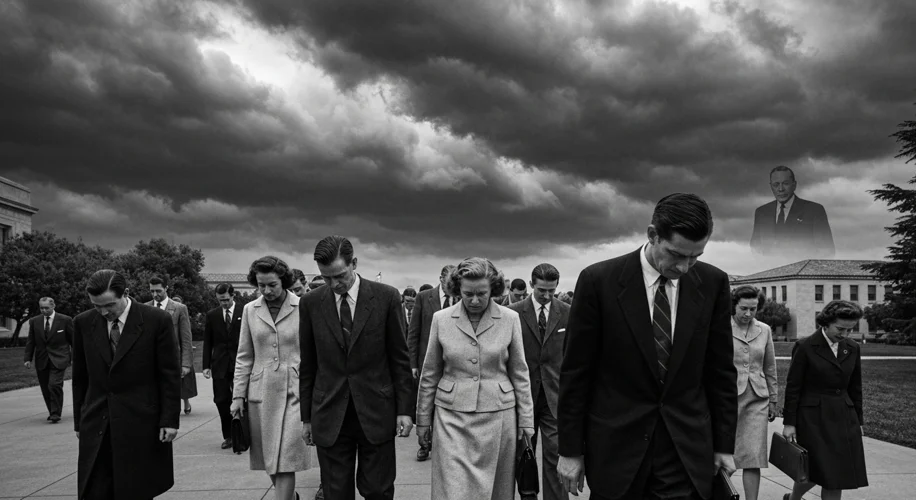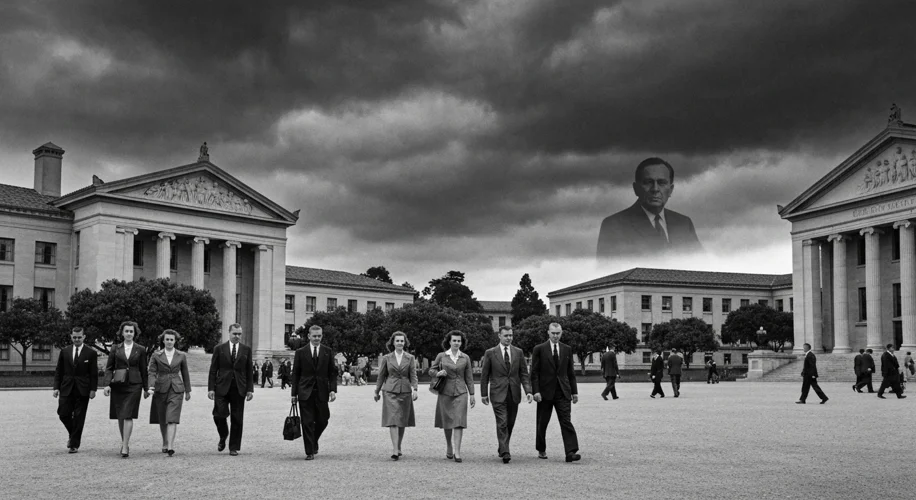The 1950s. A decade etched in the American psyche with the stark, chilling shadow of McCarthyism. It was a time when the specter of communism haunted every corner of society, casting a pall of suspicion over institutions, careers, and reputations. At the heart of this era was Senator Joseph McCarthy and his relentless anti-communist crusades, amplified by the House Un-American Activities Committee (HUAC). Their investigations, fueled by fear and often unfounded accusations, led to widespread blacklisting, the ruin of careers, and the tragic loss of livelihoods for many, particularly within academia and the entertainment industry.
But this era of political persecution wasn’t confined to distant Washington D.C. Its tendrils reached deep into the hallowed halls of education, including one of the nation’s most prestigious public universities: the University of California, Berkeley. The very mention of UC Berkeley sharing names with the Trump administration in relation to loyalty investigations, as a contemporary echo, powerfully evokes the chilling parallels to this dark period of American history.

To understand the impact on Berkeley, we must first grasp the cultural and historical climate of the time. The Cold War was in full swing, a global ideological battle between the United States and the Soviet Union. This pervasive sense of ‘us versus them’ seeped into every aspect of American life. Fear of Soviet espionage and the perceived threat of communist subversion within the nation’s borders created a fertile ground for paranoia. Loyalty oaths became commonplace, and professors, artists, and writers found themselves under intense scrutiny.
The University of California, like many public institutions, found itself caught in the crossfire. In 1949, the California State Legislature passed the Levering Act, which mandated a loyalty oath for all state employees, including university faculty. This sparked a fierce debate on academic freedom and the university’s role in a democratic society. The Academic Senate at UC Berkeley was deeply divided. Some argued that the oath was a necessary measure to protect the state from subversion, while others saw it as an infringement on intellectual liberty and a dangerous precedent.
The university regents, led by the formidable President Robert Gordon Sproul, ultimately enforced the oath. This led to the dismissal of 31 faculty members across the University of California system, including 20 at Berkeley, who refused to sign it. These individuals, often referred to as the “Berkeley Twenty,” became symbols of resistance against what many perceived as government overreach and the stifling of dissent.
One prominent figure caught in the maelstrom was Professor Edward C. Tolman, a renowned psychologist. Despite his distinguished career and lack of any actual communist affiliation, Tolman’s refusal to sign the oath, citing his belief in academic freedom, led to his dismissal. His case, and others like it, sent shockwaves through the academic community. The fear of reprisal and the pressure to conform created an atmosphere of anxiety. Colleagues eyed each other with suspicion, and the free exchange of ideas, the very lifeblood of a university, began to falter.
The impact extended beyond those directly dismissed. Many scholars, fearing they might be targeted next, self-censored their research and public statements. The vibrancy of intellectual discourse was muted, replaced by a cautious adherence to the prevailing political winds. The university’s reputation also suffered, with critics arguing that it had buckled under political pressure, compromising its core values.
However, the story of UC Berkeley during the McCarthy era is also one of resilience and eventual reckoning. The dismissed faculty members, though facing hardship, continued their work and advocacy, many finding positions at other institutions or contributing to intellectual life outside the mainstream. Over time, the university began to confront the injustices of this period. In the 1980s, UC Berkeley formally apologized to the dismissed faculty and established a series of lectures and archives dedicated to preserving the memory of their struggle and the importance of academic freedom.
The comparison to recent events, even if drawn with a broad brush, highlights a recurring tension in American history: the delicate balance between national security and individual liberties. The McCarthy era at UC Berkeley serves as a potent reminder of how fear can be weaponized, leading to the erosion of democratic principles. It underscores the vital importance of safeguarding academic freedom and the right to dissent, even in times of perceived crisis. The echoes of those investigations, the chilling effect on free thought, and the courage of those who stood firm continue to resonate, urging us to remain vigilant against the return of such shadows.

